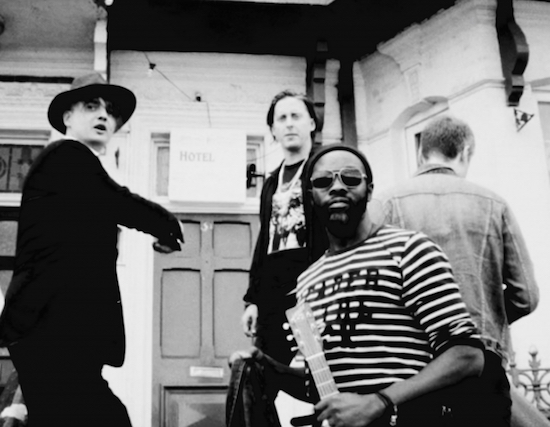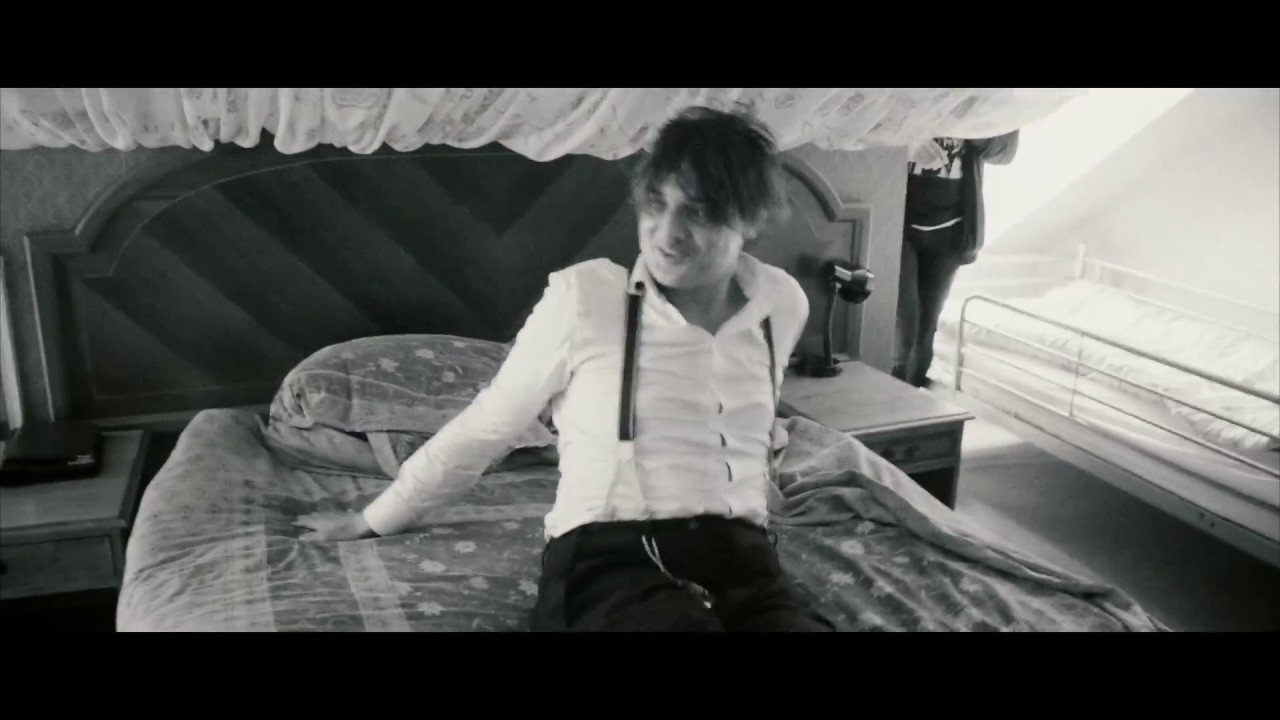"Synchronicity" is an idea originated by psychologist Carl Jung, and developed into a set of lyrics by Sting. That might sound like two good reasons to steer well clear of it – Jung used it to promote his belief in the paranormal, and Sting is Sting – but in its most elemental form, it proposes a useful concept: that of "meaningful coincidence". That is, events which are in no way causally linked, but whose simultaneous occurrence reveals something to us.
Two things happened last week that struck me as an example of synchronicity. One of them was probably the most significant recent event in the world of many tQ readers and writers: Mark E Smith died. The other probably wasn’t: The Libertines announced the naming of their prospective hotel-cum-studio in Margate; which, with a leaden inevitability to rival that of death of itself, will be called "The Albion Rooms".
What’s the connection? Each, in its way, serves as a marker of where British indie’s centre of gravity now lies, and they tell us the same thing: that this centre of gravity, which once drew us away from that of the national mainstream, now acts in concert with it. It is, to use the demotic, well Brexit. Mark E Smith dies, and the Libertines open an Albion Rooms hotel in Margate (whose progress you may, if you are sufficiently masochistic, follow on a new website billed as "Down & Out In Paris & London via a pie and mash shop on Margate prom".) Out with the always new, in with the ever old. The Theme Park Britain already so successfully packaged and sold to people whose big thing is Jane Austen, or Agincourt, or World War II, or the Attlee years, will now be available to those who buy Clash t-shirts for their babies. Cancel the prole art threat, bring on the indie costume drama.
I use "indie" in its broadest and most informal sense: that of an animating spirit which has propelled musically-allied subcultures at least from punk rock onwards. I’m not suggesting Mark E Smith died to prove a point, although the fact you wouldn’t put it past him underlines just how much we’ll miss him. Nor do I think The Libertines are Making A Statement. They’re just doing yet more of what The Libertines do – and that, of course, is the point. Mark E Smith kept on doing what Mark E Smith did because he couldn’t not do it. Because the furious compulsion that made him what he was – the need to take a host of passions, gripes and grievances about British life and transform them into art both semi-incomprehensible yet somehow possessed of enormous clarity and force – also drove him until (very nearly) his dying day. He didn’t do it because there was a market for it. There was, and that’s what allowed him to keep doing it. But as tQ’s Luke Turner has noted, not once did he pander to that market by giving it a cosy, familiar version of The Fall. You got what he bloody well felt like doing that day, that year, that record, that tour.
Pandering is, conversely, The Libertines’ modus operandi. You come for the pie and mash, and pie and mash is what you get, served up with a shtick so shamelessly mannered even Damon Albarn would have balked at it in his Parklife phase. Those knockabout facsimiles of rock & roll breathlessness, mixing up Small Faces with ramshackle neo-punk, bloody needles and endless references to a mythic England is a formula which sounds much better on paper than it does in their realisation of it. There was that "Tiddeley Om Pom Pom Tour" of seaside venues and now a Smack Your Kitsch Up establishment in a town that’s already a microcosm of one Brexit Britain narrative: a former working-class resort in a heavily Leave-voting area, patronised, in every sense, by an influx of metropolitan Remainers. The Libertines hotel is there to woo many more of them to visit and immerse themselves in a travesty of its customs; customs already undermined by the inevitable property boom, and liable to become recreated exhibits in a town-sized museum curated by its gentrifiers. Come stay at The Albion Rooms, and experience dear old Blighty as it was when its denizens could afford to live here. Even as a badge-carrying, fully-licensed, Grade Ten metropolitan Remainer, a long-time advocate of the arty and the pretentious, and someone who would join the Liberal Elite in a heartbeat if only they’d have me, I can’t help but wonder if perhaps at least one teeny little factor in the perpetuation of our ongoing culture war is our side’s absolutely crashing lack of self-awareness.
The irony of that is, it’s a culture war many of whose battles are fought not between reaction and progression, but between two retrograde visions. One may be ostensibly radical, the other overtly conservative, but both are fixated on golden ages that never truly were – whether, say, it’s the supposed simplicity (for which, read "reassuring whiteness") of a time before mass immigration; or the Spirit Of ’45 fetish shared by many who both romanticise and demonise the working classes, and whose touchstone is a post-war settlement enacted by people bearing as much resemblance to today’s left-wing figureheads as George Orwell does to George Galloway. The reality of today’s world impinges on neither; each seeks solutions from a storied past, as if putting on the clothes of history – figuratively, but sometimes also in practice – will miraculously transport you there. One person’s "vintage" is another’s "good old days". People may and should wear what they damn well please, of course; yet dress is one thing, mindset another. Where style becomes retro cosplay, things start to get iffy. No good ever comes to a country, nor its culture, by a yearning to go backwards. Anyone who pours scorn on the loathsome Jacob Rees-Mogg and the archaic affectations in which he cloaks his indecent views should take care their own opinions aren’t steeped in a rose-tinted miasma of bygone Britain.
In all of this, I do have some sympathy for Pete Doherty. Which surprises me as much as it probably does you. Doherty is one of the least sympathetic figures in the music business, and that’s against some strong competition. Damage and tragedy follow him about like hangers-on, inflicting themselves on those in his ambit. But even if I have no reason to feel for him as a human being, I feel for him as an artist. In 2009, as Peter Doherty – a small but telling change – he released his first solo album, Grace/Wastelands. It is a first-rate record, sensitive, thoughtful and supple, as nuanced and moving in the way it contends with his favoured themes (kitchen-sink Englishness, his own internal conflicts) as his work with The Libertines and Babyshambles has tended to be slight and slapdash. Around this time he played a series of solo shows at which he was barracked and taunted by crowds livid at not getting the dysfunctional, Jack-the-Lad performing monkey they had paid to see. I watched him at the Brighton Dome, alone on stage with his guitar, as a plastic pint pot flew out of the hostile pit below and spattered its contents over him. He stopped, and the venue held its breath, waiting for him to take the bait; then he mastered himself and continued. If for nothing else, I admire him for that. He had found a thing worth doing, and he pressed on with it in the face of provocation from a rabble hell-bent on seeing Kate Moss’s boyfriend perform his usual collapse into chaos. But he pressed on for only so long. The album didn’t sell, and the Libertines are once more a going concern. When the price of your fame is that you must forever thereafter be Pete Doherty, and never Peter, that’s quite the Faustian bargain.
What this suggests to me is Doherty must know what he’s doing with all this Henry the Horse Dances the Waltz hokum, this Edwardiana-on-skag, end-of-the-pier stuff. He must know that he could have been better than this. But for whatever reason, he’s gone along with it. Who knows, most of us might have done the same in his place. It’s a lot more fun to be cheered than jeered, and everybody needs to make a living. His and his band’s idiom lies in old-fangled tweeness masquerading as sleaze. It’s not just nostalgia, it’s meta-nostalgia, nostalgia in layers – a Twenty-Teens return to a Noughties revision of a Nineties fixation upon a Sixties fascination with Britain’s (literal) imperial phase. A Britain that nobody involved actually experienced – and that they think has vanished when it only fitfully, if at all, existed in the first place.
Mark E Smith wouldn’t have buckled under such pressure, we may be sure. That, as much as his scabrous vision and his talent for conveying it, is why he mattered so much. To get nostalgic for him now will be to fall into a trap he eluded – the paradox by which one mourns the past’s appetite for the original. Yet we may reckon what we have lost. We shan’t, it’s true, see his like again. But that’s not because something so singular, unruly and compelling – something quite unlike him in all respects but those – could never will itself into being on this clutch of islands. It’s because, the way things are now, we won’t allow it to.



